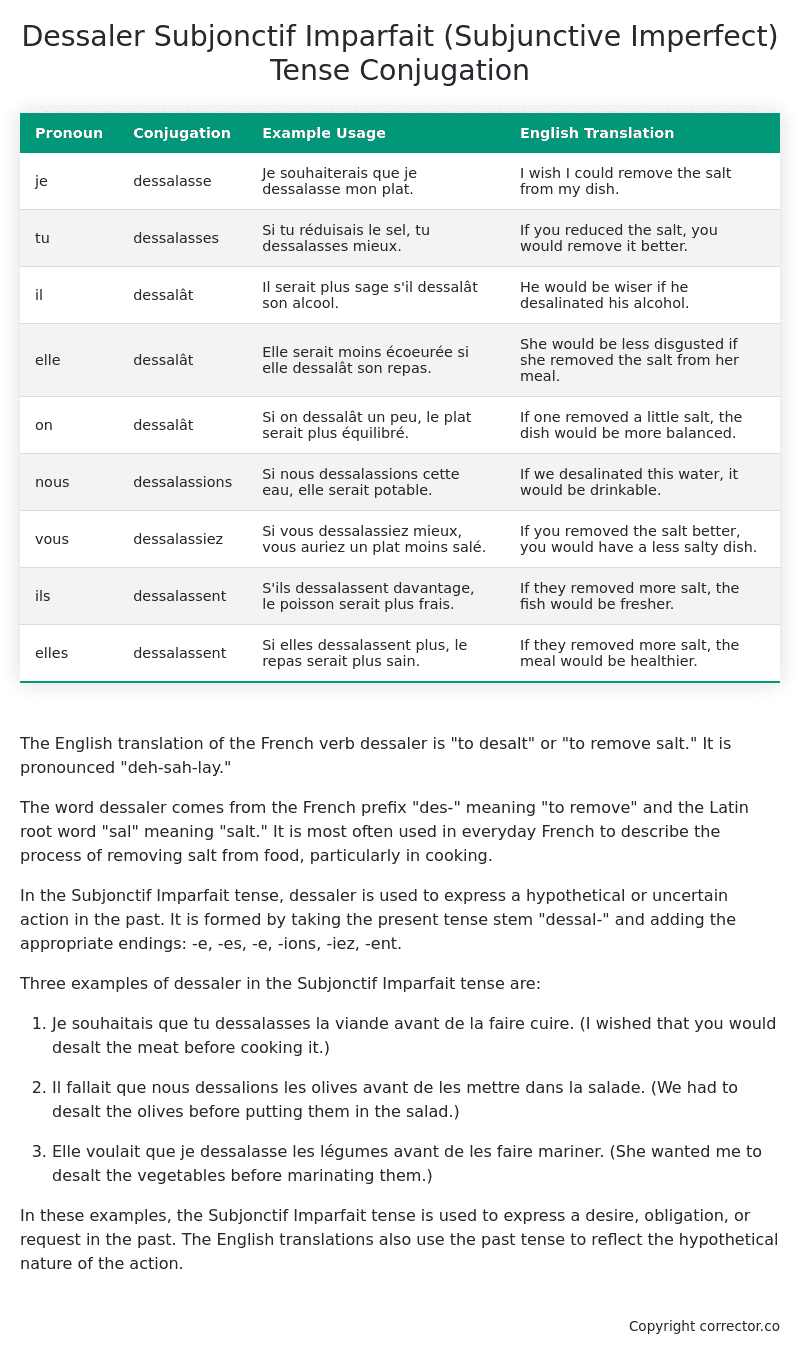Subjonctif Imparfait (Subjunctive Imperfect) Tense Conjugation of the French Verb dessaler
Introduction to the verb dessaler
The English translation of the French verb dessaler is “to desalt” or “to remove salt.” It is pronounced “deh-sah-lay.”
The word dessaler comes from the French prefix “des-” meaning “to remove” and the Latin root word “sal” meaning “salt.” It is most often used in everyday French to describe the process of removing salt from food, particularly in cooking.
In the Subjonctif Imparfait tense, dessaler is used to express a hypothetical or uncertain action in the past. It is formed by taking the present tense stem “dessal-” and adding the appropriate endings: -e, -es, -e, -ions, -iez, -ent.
Three examples of dessaler in the Subjonctif Imparfait tense are:
-
Je souhaitais que tu dessalasses la viande avant de la faire cuire. (I wished that you would desalt the meat before cooking it.)
-
Il fallait que nous dessalions les olives avant de les mettre dans la salade. (We had to desalt the olives before putting them in the salad.)
-
Elle voulait que je dessalasse les légumes avant de les faire mariner. (She wanted me to desalt the vegetables before marinating them.)
In these examples, the Subjonctif Imparfait tense is used to express a desire, obligation, or request in the past. The English translations also use the past tense to reflect the hypothetical nature of the action.
Table of the Subjonctif Imparfait (Subjunctive Imperfect) Tense Conjugation of dessaler
| Pronoun | Conjugation | Example Usage | English Translation |
|---|---|---|---|
| je | dessalasse | Je souhaiterais que je dessalasse mon plat. | I wish I could remove the salt from my dish. |
| tu | dessalasses | Si tu réduisais le sel, tu dessalasses mieux. | If you reduced the salt, you would remove it better. |
| il | dessalât | Il serait plus sage s’il dessalât son alcool. | He would be wiser if he desalinated his alcohol. |
| elle | dessalât | Elle serait moins écoeurée si elle dessalât son repas. | She would be less disgusted if she removed the salt from her meal. |
| on | dessalât | Si on dessalât un peu, le plat serait plus équilibré. | If one removed a little salt, the dish would be more balanced. |
| nous | dessalassions | Si nous dessalassions cette eau, elle serait potable. | If we desalinated this water, it would be drinkable. |
| vous | dessalassiez | Si vous dessalassiez mieux, vous auriez un plat moins salé. | If you removed the salt better, you would have a less salty dish. |
| ils | dessalassent | S’ils dessalassent davantage, le poisson serait plus frais. | If they removed more salt, the fish would be fresher. |
| elles | dessalassent | Si elles dessalassent plus, le repas serait plus sain. | If they removed more salt, the meal would be healthier. |
Other Conjugations for Dessaler.
Le Present (Present Tense) Conjugation of the French Verb dessaler
Imparfait (Imperfect) Tense Conjugation of the French Verb dessaler
Passé Simple (Simple Past) Tense Conjugation of the French Verb dessaler
Passé Composé (Present Perfect) Tense Conjugation of the French Verb dessaler
Futur Simple (Simple Future) Tense Conjugation of the French Verb dessaler
Futur Proche (Near Future) Tense Conjugation of the French Verb dessaler
Plus-que-parfait (Pluperfect) Tense Conjugation of the French Verb dessaler
Passé Antérieur (Past Anterior) Tense Conjugation of the French Verb dessaler
Futur Antérieur (Future Anterior) Tense Conjugation of the French Verb dessaler
Subjonctif Présent (Subjunctive Present) Tense Conjugation of the French Verb dessaler
Subjonctif Passé (Subjunctive Past) Tense Conjugation of the French Verb dessaler
Subjonctif Imparfait (Subjunctive Imperfect) Tense Conjugation of the French Verb dessaler (this article)
Subjonctif Plus-que-parfait (Subjunctive Pluperfect) Tense Conjugation of the French Verb dessaler
Conditionnel Présent (Conditional Present) Tense Conjugation of the French Verb dessaler
Conditionnel Passé (Conditional Past) Tense Conjugation of the French Verb dessaler
L’impératif Présent (Imperative Present) Tense Conjugation of the French Verb dessaler
L’infinitif Présent (Infinitive Present) Tense Conjugation of the French Verb dessaler
Struggling with French verbs or the language in general? Why not use our free French Grammar Checker – no registration required!
Get a FREE Download Study Sheet of this Conjugation 🔥
Simply right click the image below, click “save image” and get your free reference for the dessaler Subjonctif Imparfait tense conjugation!

Dessaler – About the French Subjonctif Imparfait (Subjunctive Imperfect) Tense
Formation
Common Everyday Usage Patterns
Interactions with Other Tenses
Subjonctif Présent
Indicatif Passé Composé
Conditional
Conditional Perfect
Summary
I hope you enjoyed this article on the verb dessaler. Still in a learning mood? Check out another TOTALLY random French verb conjugation!


